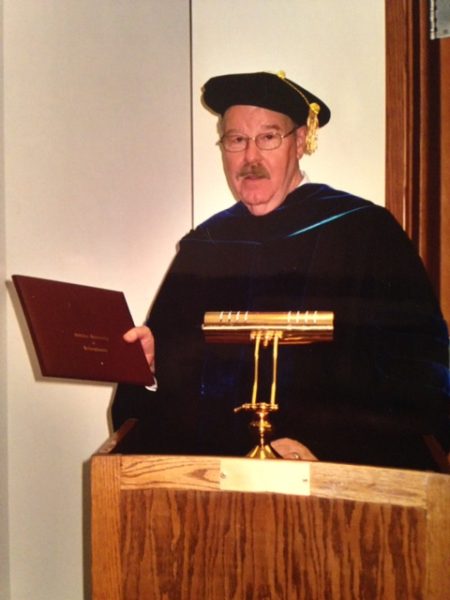(Editor’s Note: Each of the six candidates in the race for two seats on the Ohio County Board of Education was asked to reply to five questions concerning the future of Ohio County Schools so that their answers could be published free of charge. The stories will be published based on the order the replies were received from a total of 16 candidates running for Assessor, the Board of Education, County Clerk, and County Sheriff.)
Dr. Roger Smith, Candidate, Ohio County Board of Education
Dr. Roger Smith has spent 50 years of his life in a classroom teaching the Spanish language to anyone wishing to learn on various levels, but now he feels he could best serve the students of Ohio County as a member of the Board of Education.
Born in Martins Ferry, Ohio, Smith became known as “Señor Smith” thanks to his own education in Hispanic Literature, 17 years of teaching on the secondary-school level, and the 33 years he’s spent teaching at universities. Most recently he spent seven years as a Spanish teacher for Ohio County Schools and 20 years doing the same at Indiana University of Pennsylvania, where he was named a full professor in 1999.
Smith was the first teacher to receive the Foreign Language Teacher of the Year Award in 1982 from the West Virginia Foreign Language Teachers Association, and he was selected as the coordinator of Foreign Language Program Development in 1984 by the W.Va. Department of Education. His resume also includes high-level acknowledgements in both Pennsylvania and in the Mountain State.

What are your primary reasons for filing to run for a seat on the Ohio County Board of Education?
I believe that I bring at least three unique perspectives to the board. First, I can identify with the educational needs of three types of student. The experience of growing up at my parents’ motorcycle shop and as the son of a machinist has made me a strong proponent of vocational education.
At the same time, a well-balanced general education program is essential for the undecided student who is probably not going to college. During my 33 years teaching at the college level, I have encountered many students who should not have been there. However, inasmuch as a college education opens many doors, a challenging college prep program must have equal billing in curriculum.
A second unique perspective comes from my six-year stint as a department chairperson with 16 faculty members. My responsibilities included managing the budget, making decisions with the dean regarding faculty hires, proposing curricular modifications, and fostering a harmonious working relationship with eleven other chairpersons within the college.
Thirdly, my 50 years as a classroom teacher have enabled me to know firsthand the practical day-to-day realities faced by the teacher and to recognize policies that might reduce effectiveness in the classroom.
What is your opinion of the most recent test scores received by Ohio County’s public school students; how do you believe improved scores can be achieved in the future; and do you feel those scores represent an adequate way to judge a school district’s employees?
In my view the institution of standardized testing — in theory an effective way to determine where we are and where we need to go in the classroom — leaves a lot to be desired. First, we are attempting to determine academic progress based on two different tests with indecision regarding future tests.
My primary concern is that “student” test scores do not morph into “teacher” test scores. For me, the scores are invalid unless we have a benchmark indicating each student’s level at the beginning of their study and a test that evaluates the progress made during a specific course for which the teacher is responsible. Even at that, currently there are no consequences for the student who does not take seriously the testing outcomes. Why do we continually insist on denying that a wide range of individual abilities, motivations, and needs exists?
How important do you believe the current arts programs are to a child’s education?
If by “arts programs” one is referring to the Fine Arts, I would suggest that these programs are an essential feature of the American school curriculum, which is committed to meeting the needs and fulfilling the dreams of each student. This commitment is sometimes compromised by the issues of class offerings and class sizes. Because arts programs don’t fit the paradigm for such programs as English, mathematics, or social studies, often they are considered to be optional. Many students need only the stimuli offered by an arts program to find real meaning in school attendance. An outstanding teacher is in effect a performing artist.

What ideas do you have at this time to increase the amount of parental involvement with the Ohio County public school system?
When it comes to a child’s education, parental involvement undeniably is the key that leads to the child’s success. The cultivation of parental involvement should be begun at the elementary level or earlier. For example, the parents who bring their child to school could be invited in for a cup of coffee and to meet school personnel. Other efforts could include planner evenings and the recruitment of parent volunteers as a resource. Once this involvement becomes a tradition in the school system, it must be continued through middle school and high school. An example is the picnic to welcome freshmen and their parents to the high school. The PTA is commonplace in the elementary school. Perhaps we should make an effort to encourage PTAs in the secondary schools. We need to continue to promote the advantages of Edline and encourage e-mails to those parents who cannot be reached by phone. Unfortunately, the reality is that some parents will never become involved despite our best efforts. Communication in any form is essential.
What should be the top priorities be for the members of the new school board and the new superintendent heading into the 2016-2017 academic year?
Local control of education through elected school boards is a deeply ingrained American political tradition that brings with it tremendous responsibilities. First, a school board member should become familiar with each school building and its personnel in order to act from a position of knowledge. A member must acknowledge that adopting policies, solving problems and responding to the taxpayers are best carried out as a team effort. An individual board member will be judged by the success or the lack of same achieved by the board as a whole. Four main responsibilities are the institution of a sound fiscal policy, the formal adoption of policies to guide the school system, the assurance that the school administration is implementing the agreed upon policies, a sort of checks and balances, and lastly, to issue a judgment concerning actions of students, teachers and administrators.
In summation, listen, do your homework, and ask sharp questions.
(Photos provided by the candidate)



